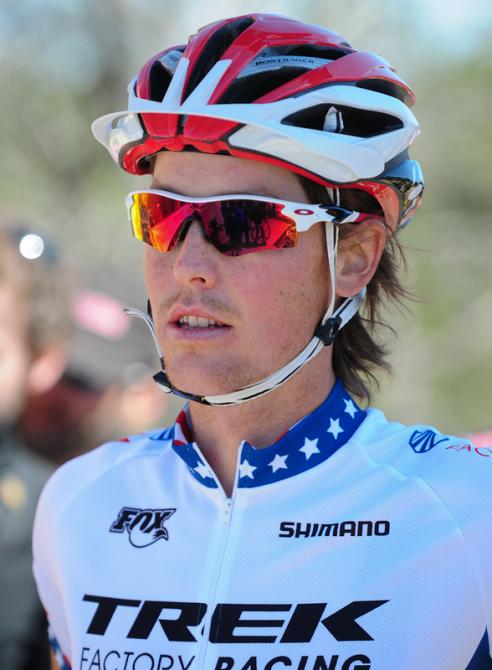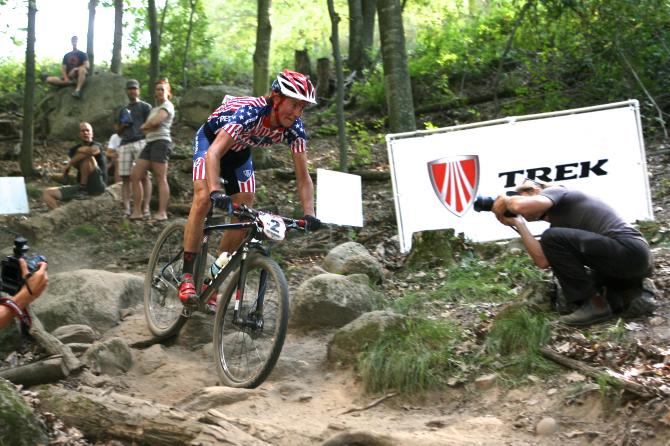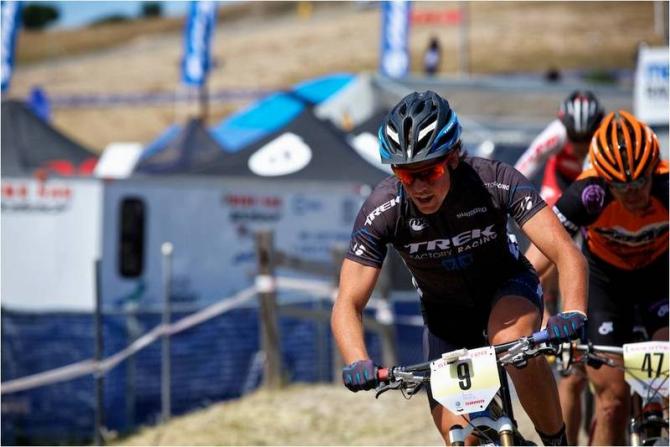Schultz makes comeback with Team Sho-Air/Cannondale
Olympic mountain biker recovers from back injury



For years, Sam Schultz pushed through pain in his back as he chased his Olympic dream. The American mountain biker had his best season yet in 2012, winning the cross country national championship and finishing 15th in the London Olympics, but soon afterward, he was forced to take an extended period off from racing and training to address the pain. After missing the entire 2013 season, Schultz has just signed with Team Sho-Air/Cannondale and he's looking ahead to returning to racing in 2014.
"I'd like to get back to racing. My motivation is higher than it's ever been. I'm just excited," the 27-year-old Schultz told Cyclingnews. "Sho-Air/Cannondale seem very supportive. The team is the perfect fit." He has committed to a one-year deal with his new team, with an option to extend for a second year.
"I have a lot of respect for Sam. I've watched him grow up in cycling," Team Sho-Air/Cannondale owner Scott Tedro told Cyclingnews. "We already had a great team with our current riders, but I was stunned to hear that he'd been released by his former team. We found the budget to sign him. If his surgery is successful, I believe he'll come back stronger than ever. He's matured a lot through this experience, and I think the sport owes him the opportunity to come back."
After facing the most prolonged injury of his career in late 2012 and 2013, Schultz said, "I've learned a lot in the past year. The biggest thing is that I've been reminded of how much I love racing my bike. The injury has also reminded me how important health is. Without that, you don't have anything. After having a back issue, it seems like everyone I talk to has had a back issue at some point, too. But you don't get it until you've had it. Back stuff takes over everything. You can't get comfortable moving. You can't get comfortable sitting. You can't sleep. I was a mess, but it's good to be on the path to healing."
Schultz's back woes started about six years ago. "I ignored some issues for a long time. I had back problems which went into my hips and glutes. I didn't know what was going on. I always did a lot of physical therapy and tried to balance myself out as much as possible, but it didn't take care of the problem and only helped a little bit. It seemed like the issues were getting worse."
"Last year, I had my head down, I was so focused on going to the Olympics, I pushed through a lot. I'm psyched I did that, and I'm super happy with what I could do last season; however, when I got to the time I was training early last winter for 2013, nothing was working. I couldn't get consistent rides in without having a lot of pain. This year has been one when I was forced to step back and think big picture."
Troubleshooting
Get The Leadout Newsletter
The latest race content, interviews, features, reviews and expert buying guides, direct to your inbox!
Instead of racing, Schultz, who previously raced for Trek Factory Racing, immersed himself into trying to figure out what was going on in his body. He had an MRI, which gave him a diagnosis of degenerative disc problems. Then it was time to figure out what to do.
"I went at it from every angle possible. I started with the most conservative options. I knew what the problem was and was trying to correct it. I had a lot of great people coming out of the woodwork to help me. That's been the coolest thing about this whole process. I did every physical therapy imaginable and I wasn't having any luck, so I started thinking out of the box. I tried acupuncture and foundation training, but nothing was cutting it."
Consultation with doctors around the country followed, and Schultz ended up connected with a doctor in Florida who proposed a non-instrumented disc fusion in his spine. Other doctors confirmed that was the best approach and Schultz underwent surgery on October 15. Parts of his spine were fused, but with no hardware left inside him, his recovery and long term prospects should be good.
"I'm still recovering, but within a few days after surgery, my nerve-based glute issue was gone," said Schultz. "I could actually sleep and not fidget around all night. It seems like I'm on the right track. I'm excited to keep on recovering and get back to racing next season."
Schultz talks with his Florida doctor each week and is back on an indoor trainer, pedaling with a slightly more upright position to keep his spine and pelvis in alignment while his back continues healing.
"I'm feeling great riding indoors, and I'll probably have the green light for anything riding-wise by the end of the year. Leading up to that, I'll get more and more freedom. I'll probably get to be out on a road bike soon. I want to take it conservatively, and it's winter here anyway."
The comeback plan
Based in Missoula, Montana, Schultz plans to do his annual migration to Arizona this winter to prepare for the early season. He'll skip the first two World Cups in South Africa and Australia, and begin his comeback at several domestic races such as the US Pro XCT series, Sea Otter and the Whiskey 50. He may also head to the Continental Championships to start rebuilding his UCI points tally and earn a better start position at the third World Cup. As the 2012 US National Champion, Schultz also has hopes of doing well at the US Mountain Bike National Championships.
"I'll be focused equally on domestic stuff and World Cup stuff. I'm excited to tap into a few events I haven't gotten to do in the past," he said.
Schultz is motivated by the prospect of returning to racing with his new team.
"Everyone I've talked to has said that the time I've had off and away from racing will just make me hungrier and faster and stronger. I'm so fired up to get back to it. I'm obviously going to do everything I can to come back stronger than ever. Giving your body a break is good. For me, after ignoring that stuff for so long, I'm excited to race without having crazy nerve stuff going on. There's a lot to look forward to."
"The fit with the Sho-Air team will be great. It's important to feel good about where you are team-wise. Having them believe in you and vice versa goes a long way."
Sue George is an editor at Cyclingnews. She coordinates all of the site's mountain bike race coverage and assists with the road, 'cross and track coverage.